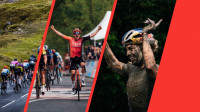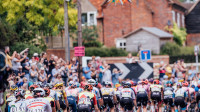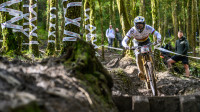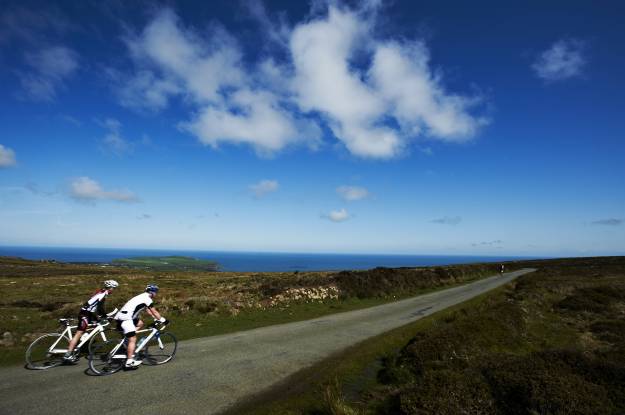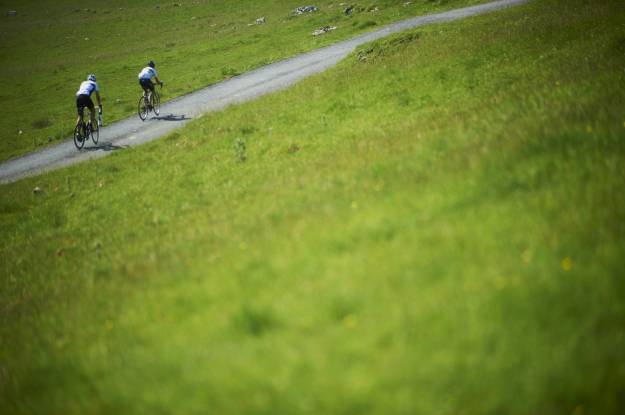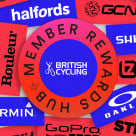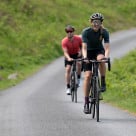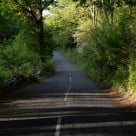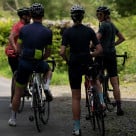Below are the testimonials that accompanied the nominations for the British Cycling Gold Badge of Honour for two true legends of the sport. Both nominations were passed by the 2012 British Cycling National Council meeting - the actual presentations will be made at the 2013 Annual Awards Dinner.
GOLD BADGE OF HONOUR - John Rawnsley
Behind every great race, there is a great man and for the 3 Peaks it has only ever been John Rawnsley. Now in his 75th year, John is going out with a big bang as he completes 50 versions of the iconic event that at 38 miles saps the legs of even the world class athletes that take it on. This year is no exception as Thomas Frishknecht, the Swiss Cyclo Cross & MTB legend tries his hand to win in a field that will hit 700.
John then moves into November and the quirky cyclists versus harriers event on Baildon Moor and a round of the Yorkshire Points Series at Myrtle Park, Bingley before his final event as the National Cyclo Cross Championships returns to the twin levels of Peel Park, Bradford.
You could be forgiven in thinking that Cyclo Cross goes through John Rawnsley like a stick of rock but that would be only part of what he has done. Starting cycling in 1954 at the junior age of 17 with the Bradford Elite Cycling Club, he quickly found his mark in road racing and moved on to what was to become a major team in road racing, namely Yorkshire Road Club. Here he teamed up with Vin Denson and Geoff Salter to race in the major classics of the day. Few will know that he raced against major riders like Barry Hoban and Tom Simpson as they started on their way to continental contracts. But by the end of the 50’s, Cyclo Cross was calling as was a move to his current club, Bradford RCC.
As with most things, more than one person was looking at the 3 Peaks on a bike and whilst John was not the first to attempt it prior to the races, it was the man and his club that started it going in 1961. 35 hardy souls took to the line, John included and by the end, John was the winner of the 23 that survived. The rest they say is history and many famous names in cycling have entered the event and become the favourite of that year to win and found out the hard way that this race doesn’t take prisoners and being a star in one discipline of cycling can in no way prepare you for what you are about to receive.
Other little known facts about John are his lifelong membership of the Bingley Harriers which has seen him running a race called the 3 Peaks! and bringing across to Cyclo Cross, some of the major stars of the Cross Country & Fell Running community at both local and international level. The love of both sports saw him become the ‘trainer’ of many current and past stars of our sport as they went from youth to vet on a diet of Wednesday & Sunday trips into the Dales, following their Pied Piper.
This continues to this year as the popular 3 Peaks training day gives new riders an idea of what is to come, a short 4 weeks beforehand. Ever meticulous, I can say with accuracy that John has ridden, run and walked the 3 Peaks a total of 152 times, which at a notional 30-35 miles a time is pushing 5,000 miles on the 3 hills. John joined the Yorkshire Cyclo Cross Association in 1959 and has been its President for the last 35 years.
From a winter of Cyclo Cross followed by 2 months running training and a summer of Fell Running, John has eased back to a more relaxed life via 4 London Marathons and his annual Candlelighters ride (110miles) to major on the Vets National Champs, Inter Area, National Trophies and National Champs as an alternative!
Truly an amazing person and what the sport of cycling is all about.
GOLD BADGE OF HONOUR - Doug Dailey
Following a long and successful career as a rider, Dailey became an integral part of the GB Cycling Team, head coach during the lean years of the 1980s and into the 1990s, before playing a key role in GB Cycling Team’s phenomenal development into the world’s leading cycling nation, providing critical back line support to GB success in Sydney, Athens, Beijing and London, as well as countless World Cup and World Championship events across the disciplines.
Dailey, born in Orrell Park, Liverpool in 1944, began his cycling career with the Melling Wheelers, under the guidance of legendary cycling coach Eddie Soens, gaining his first major race wins at age 19, winning the Mersey Roads Two Day and the fledgling Eddie Soens race in 1963. Dailey joined Kirkby Cycling Club (of which he is a life member) and went on to win the Mersey Roads again in 1967 and 1973 and the Soens a further three times in 1964, 1970 and 1977.
The peak of Dailey’s cycling career came in 1972, when he won the first of two British National Road Race titles and represented Great Britain in the Munich Olympics. A year later Dailey took overall victory in the Tour of Ireland and the Girvan Three-Day, taking two stage victories in the latter. Dailey added a second national road title to his palmares in 1976, thirteen years after his first major win.
Doug Dailey’s phenomenal 26 year long cycling career finally came to an end in 1986, (a career which, in cycling terms spanned from the Anquetil to the Lemond era) but it was in many ways just the start of another career which eventually yielded success on a whole new level, Dailey turning his years of experience to the task of nurturing the new wave of British riders that emerged in the late 1980s.
Following his retirement from racing, Dailey become national coach for the GB team, in an era when the squad was run with minimal staff and on a shoestring budget; Dailey fulfilling roles which are now distributed across an expansive team of logisticians, coaches, masseurs, soigneurs, drivers and other support personnel. Dailey continued in this role until 1996 and after a short break, returned as logistics manager.
Doug was tasked with ensuring that riders, bikes, kit and support personnel were in the right places at the right times, a job which, following the advent of lottery funding, increased in complexity as the team, its attendant kit and backroom staff increased exponentially. In the build up to the London 2012 Games Doug became cycling’s Sports Engagement Manager, under secondment to the BOA. His vast experience and knowledge of the Olympic Games made him perfect for the job and ensured that the GB Cycling Team had nothing to worry about within the Olympic environment.
Dailey’s appointments at the heart of the GB Cycling Team setup, first as national coach, then as logistics manager and finally as Sports Engagement Manager, have neatly bracketed what will be remembered as the golden age of the Great Britain Cycling Team. Dailey was national coach when Boardman struck gold in the Individual Pursuit in Barcelona in 1992; the event which started the ball rolling on British Cycling’s success story.
Dailey had been in post as logistics manager for three years when Jason Queally won gold in the kilometre at Sydney in 2000; the beginning of the medal landslide, which continued in 2004 in Athens and then reached a crescendo in Beijing and London. For his part in this unprecedented success, Dailey was awarded an MBE for services to cycling in the 2008 Queen’s New Years Honours List. Dailey’s contribution was further recognised by British Cycling in 2009, when he was inducted into British Cycling’s Hall of Fame, one of 50 illustrious figures representing 50 years of British Cycling.
Doug has been involved in the development of dozens of talented British cyclists throughout his career, including Chris Boardman, who summed up Dailey’s contribution to his stellar career and the sport as a whole: “Doug Dailey has been in my cycling career since I was in single figures and he is the most inspirational figure to me in cycling,” said Boardman.”I’ve never seen anyone so positive for the sport of cycling for what must be over 30 years and he’s going to be irreplaceable.”


